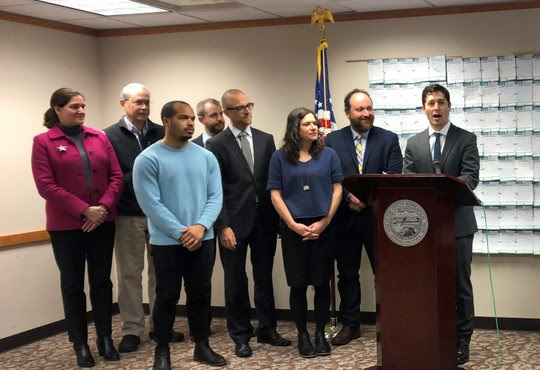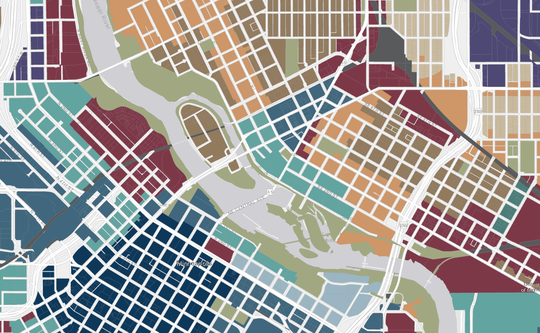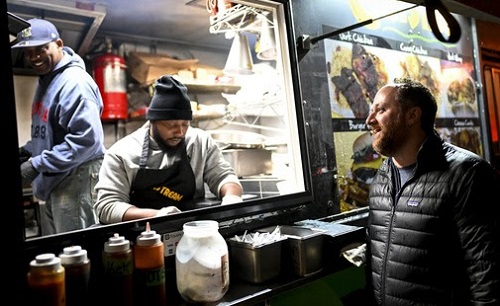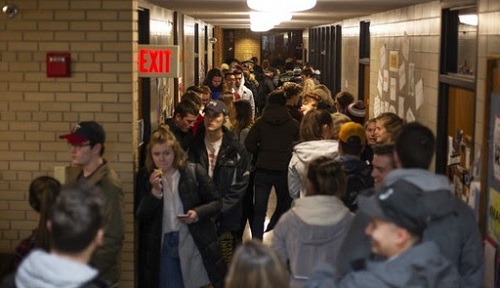December E-Newsletter from 3rd Ward Council Member Steve Fletcher
 Thursday, December 13, 2018 at 4:42AM |
Thursday, December 13, 2018 at 4:42AM |  Kim Eslinger |
Kim Eslinger | 
We Adopted Our 2019 Budget!

On Wednesday, December 5th, the City Council approved the City's $1.55 billion 2019 budget after our final public hearing. I'm really proud of so much of what we've put into this budget and how it aligns with our values. There's more detail on some of the highlights below.
I want to thank Mayor Jacob Frey for making an outstanding budget proposal, and especially for the historic investment of more than $40 million in affordable housing. Budget Committee Chair Linea Palmisano also deserves a lot of credit for making our budget process as open and transparent as it was, including by adding an additional public hearing for you to share your feedback with us.
It's worth noting that the total changes made by the City Council represent a small fraction of the Mayor's proposed budget. Mayor Frey made some major moves with his budget proposal - on housing, on economic development, on public safety, and more - almost 90% of which we preserved without any change, and for which I proudly cast my vote.
One significant change I led on, along with Council Member Phillipe Cunningham, was to increase our investment in public safety and violence prevention beyond policing. To fund this, we removed a little over $1 million that the Mayor had proposed to fund new positions within MPD. That means instead of increasing the MPD budget by 2.8%, we're increasing it by 2.2%. Those funds will instead be invested in the following:
- An expansion of the successful Mental Health Co-Responder pilot program to all five police precincts, rather than just three;
- a staff position and stable funding for the newly formed Office of Violence Prevention to invest in collaborative, community-based safety strategies, including downtown safety initiatives that had been funded on a one-time basis in recent years;
- ongoing funding for the Next-Step Youth Violence Prevention program;
- outreach funding for the Youth Coordinating Board in the Cedar-Riverside area;
- ongoing funding for successful pilot programs in the City Attorney's office on domestic violence outreach and alternative pathways for weapons offenses;
- adding staff capacity in the Office of Police Conduct Review and the City Coordinator's Division of Race & Equity;
- increasing funding to the Collaborative Enforcement program in the Labor Standards Division of the Department of Civil Rights; and
- restoring funding for Legal Services for Immigrants and Refugee Residents.
Some other highlights include amendments by Council Member Jeremiah Ellison and Council President Lisa Bender that added resources to a revolving loan to fund repairs to restore rental properties and avoid tenant displacement, and that shifted additional money to legal defense for tenants facing eviction. Both of these fill important gaps in our city's current approach to producing and maintaining affordable housing, and I am proud that I got to vote for them on behalf of Ward 3.
During our final markup, I proposed one final amendment to the budget to add a position in Public Works that will collaborate with our Planning Department on infrastructure investments and public realm improvements in areas anticipating rapid development. This idea came straight out of a lot of meetings and conversations I have had with residents across the ward about areas with a lot of planned projects, and I was very pleased to see the funding to create this position pass unanimously! I'm especially grateful to Public Works Director Robin Hutcheson and CPED Director David Frank for working together to support the creation of this new collaborative role between their two departments.
Our budget is one of the strongest reflections of our values that we can make year in and year out, and I am proud of the work we did to make sure our 2019 budget reflects the values and priorities we all want to see front and center in our work to make Minneapolis an even greater City for all.
Final City Council Meeting of 2018

On Friday, December 7, we had our final City Council meeting of 2018, and we passed several exciting ordinances and policies that reflect the culmination of, in many cases, over a year's worth of work by my colleagues.
In addition to approving the Minneapolis 2040 Comprehensive Plan and sending it to the Metropolitan Council for their consideration (more on that below), we also passed:
- an ordinance enabling the creation of a Municipal ID program;
- an amended Unified Housing Policy with an interim Inclusionary Zoning Policy for 2019, which will require some affordable housing units in projects seeking an increase to the density allowed under current zoning. A more permanent policy will be developed in 2019;
- an ordinance creating the Office of Violence Prevention in the Department of Health, for which we allocated funding in the 2019 budget for collaborative, community-based safety strategies, including downtown safety initiatives that had been funded on a one-time basis in recent years;
- an ordinance I authored with Council Member Cunningham to expand and clarify the powers and duties of the Fire Chief to include emergency rescue and emergency medical response services, as they prepare to pilot a Mobile Integrated Healthcare model with Hennepin County;
- a set of Enterprise Operational Policies within our Strategic and Racial Equity Action Plan;
- and a motion allowing Public Works to move forward with the expansion of the Hiawatha Maintenance Facility while investing in the development of a training facility on that site into a multi-faceted community asset.
We also reappointed Police Chief Medaria Arradondo to his first full three-year term!
Taken together, this final Council meeting closed out an incredibly productive year towards making Minneapolis a safer, healthier, more equitable City, and I'm proud of the work and energy I was able to contribute to our accomplishments.
Minneapolis 2040 Comprehensive Plan Approved, Now Goes to Metropolitan Council for Review

On Friday, we approved Minneapolis 2040, the City’s Comprehensive Plan, which will help shape how the city will grow and change over the next two decades so all residents can benefit.
The Comprehensive Plan calls for allowing more housing options, especially in areas that lack housing choices and access to transit, goods and services. It also includes several policies to make the city more resilient to climate change.
My amendments to the plan included:
- Encouraging larger, family-supportive housing units near our Public Schools
- Ensuring that the City's data collection safeguards the data privacy of residents and visitors, and calling for the adoption of a City-wide Data Privacy Policy to govern data collection, retention, sharing, and use by City departments and vendors about City residents and visitors. (This is a policy I introduced as a subject matter earlier this year, and will be developing in detail soon).
- Requiring buildings with inactive uses, like storage facilities or adult entertainment establishments, to be screened with active uses on the street or to be located above or below street level.
- Together with Alondra Cano, directing staff to replace "citizen" with "resident" any time it appears throughout the plan.
- Amendments to the Land Use and Built Form maps to better align with the Minneapolis Park Board's Central Mississippi Riverfront Regional Park Plan.
My colleagues brought many thoughtful amendments that strengthened the plan, and overall I think it's an excellent document that we should all be proud of for its commitment to racial equity and addressing the urgent challenge of climate change. I want to especially commend Council President Bender and Council Member Kevin Reich for their work on this plan over the last three years to get us to this point.
You can learn more about the plan at Minneapolis2040.com and read all of the considered amendments here on the City's Legislative Information Management System (LIMS).
Partners Open Temporary Navigation Center for People Experiencing Homelessness
This fall, the City Council approved a 1.25-acre site at 2109 Cedar Ave. in south Minneapolis as a temporary site for a Navigation Center that will provide a safe and service-rich environment for up to 120 single adults experiencing homelessness, and approved $1.5 million in funding towards its construction. I have been one of four City Council Members serving on a working group with City staff and partner organizations, and I am glad that it has now opened and people have begun to move in.
The Red Lake Nation and Simpson Housing Services have announced their commitment to lead the center. The Red Lake Nation owns the site and will provide security and some of the social services at the center, which will remain open until May 2019. After that, the Red Lake Nation is breaking ground on a new affordable housing project on the site.
Simpson Housing Services will provide shelter operational support. The City has worked closely with these and other coalition partners on the development of the center, which will offer the opportunity to regain safety and engage in pathways to permanent housing, income, healthcare and stability. Voluntary, individualized case management services will be provided on site by partner agencies.
To date, partners involved in outreach at the encampment have assisted more than 80 people with securing access to supportive housing. Following the opening of the Navigation Center, leaders from the Red Lake Nation and Metropolitan Urban Indian Directors (MUID), who have been providing support at the encampment site since it began, will take the lead in helping transition people from the encampment to the center or alternative locations.
Coalition partners (including those mentioned above plus Hennepin County and the State of Minnesota) are committed to collaborating on the transition to the Navigation Center, shifting existing encampment supports to the center, and the eventual closure of the encampment, which we all recognize is not safe given the cold weather and other conditions.
The City also remains committed to working with partners on long-term housing solutions, including developing recommendations for housing geared toward Native Americans experiencing chronic homelessness. There are some encouraging signs that some of those long-term solutions are already in the works.
"Collaboration is helping make downtown Minneapolis safer"
 Photo credit: Aaron Lavinsky, Star Tribune
Photo credit: Aaron Lavinsky, Star Tribune
Last month, I shared a story from the Star Tribune on some of the work we've been doing as a city around downtown nightlife.
Downtown violent crime is down over 24% from 2017 to 2018 year-to-date, and it is truly the result of not just a strong economy but all of the collaborative work by the Mayor's office, the City Council, City staff in numerous departments, and so many community partners. I look forward to continuing this work in 2019 and beyond through the development of collaborative safety strategies with the Office of Violence Prevention and all downtown stakeholders.
Record Turnout in 2018 General Election
 Photo credit: Ellen Schmidt, MN Daily
Photo credit: Ellen Schmidt, MN Daily
The 2018 General Election on November 6 was historic for more reasons than one, and all of them good.
First, Minnesota once again led the nation in voter turnout, and we very nearly had the highest statewide midterm turnout ever, second only to 2002 by half a percent.
- Total turnout in Minneapolis was 76% of registered voters, with 207,114 ballots cast - the highest City midterm turnout in 50 years!
- A total of 52,313 absentee (early) ballots were cast in Minneapolis for 25% of total turnout.
- In Ward 3, we had 74% voter turnout, just under the City- and County-wide average.
Ward 3 also had the highest number of absentee ballots cast anywhere in the City (6,287), and the highest number of Election Day voter registrations (3,472). On Election Day, when I heard that lines were long in Precinct 1 in Dinkytown, I went over to the polling place and had a great time talking with students to thank them for being voters. Precinct 1 had the highest number of Election Day voter registrations in the City, with 1,097!
Finally, we elected an amazing and historically diverse group of people to represent us at the County, in Saint Paul at the State Capitol, and in Washington, DC! I am looking forward to working with County Commissioners-Elect Angela Conley and Irene Fernando, County Sheriff-Elect Dave Hutchinson, State Representative-Elect Mohamud Noor, Governor-Elect Tim Walz and Lieutenant Governor-Elect Peggy Flanagan, Attorney General-Elect Keith Ellison, State Auditor-Elect Julie Blaha, Congresswoman-Elect Ilhan Omar, and the rest of our outstanding delegations.
Governing is truly a multi-jurisdictional effort, and I am confident that through strong relationships I can work together with my fellow elected officials at all levels of government to get things done for Minneapolis and Ward 3.
City Council approves $12 million in affordable housing investments throughout Minneapolis
The Minneapolis City Council recently approved $10.6 million in direct investment and $1.6 million in 10-year federal tax credits to create or preserve 764 units of affordable multifamily rental housing in 10 projects located throughout the city.
These investments are the result of awards from the City’s Affordable Housing Trust Fund and federal Low-Income Housing Tax Credit programs for 2018. Together, these investments will make more than $188 million in additional private and public resources possible.
Renters represent three out of four households in Minneapolis that are paying more than 30 percent of income for housing. The Affordable Housing Trust Fund and the federal Low-Income Housing Tax Credit programs provide up front equity and gap financing to assist with the production and preservation of decent, safe and affordable multifamily rental housing.
The City Council approved the following projects for a preliminary reservation of the federal Low-Income Housing Tax Credit programs totaling $1.6 million:
- In Ward 2, $587,103 for the Maya Commons project: 50 units of affordable workforce housing with a wellness focus, including eight units for people experiencing homelessness.
- In Ward 12, $983,475 for the Amber Apartments project: 81 units of affordable housing with support services for people with disabilities including 17 units for people experiencing homelessness.
These tax credits will generate more than $20.5 million in up front equity for these developments.
The City Council also approved a total of $10.64 million from the Affordable Housing Trust Fund for the following projects today:
- In Ward 3, $700,000 for the Gateway Northeast project, 125 units of mixed-use, mixed income housing.
- In Ward 7, $1.95 million for the Lydia Apartments project: 78 units of low income housing for disabled adults experiencing homelessness.
- In Ward 7, $465,500 for the PERIS Development project: 41 units of affordable housing, including 15 supportive housing units for at risk youths aging out of foster care.
- In Ward 4, $625,000 for the Prosperity Village project: 25 units of affordable family housing.
- In Ward 5, $2.75 million for the Northside Artspace Lofts project: 100 units of mixed income family housing.
- In Ward 5, $775,000 for the Penn Avenue Union project, 64 units of affordable family housing.
- In Ward 10, $1 million for the Raines Building project: 89 units of affordable senior housing.
- In Ward 10, $2.375 million for the Lake Street Apartments project: 111 units of affordable housing including six permanent supportive units and three units for people experiencing homelessness.
Minneapolis buildings exceed energy challenge goals
Minneapolis’ Building Energy Challenge winds up as a success with 75 percent of participating large buildings meeting or surpassing City emission reduction goals. They each reduced their greenhouse gas emissions at least 15 percent by becoming more energy efficient and by getting energy from clean sources such as wind and solar. Minneapolis ended the four-year challenge by awarding 10 buildings for reducing climate change pollution equal to the energy use of more than 2,000 homes a year.
Two of the 10 buildings switched to 100 percent renewable and clean electricity, nine of the buildings improved their heating and cooling systems and controls, and nine installed energy-efficient lighting.
Besides cutting pollution and saving money, energy efficient buildings can also attract more tenants and increase real estate values. Making buildings more energy efficient can support new jobs in clean technology and engineering.
The 10 high-performing large commercial buildings recognized for cutting their climate change pollution:
- Butler Square
- Calhoun Square
- DeLaSalle High School
- Forensic Sciences Building
- Hennepin County Government Center
- Hospital Parking Ramp
- Minneapolis City Hall
- Minneapolis Convention Center
- Royalston Maintenance Facility
- Wells Fargo Home Mortgage Minneapolis campus
The City of Minneapolis recognizes climate change as a serious problem to which human activities contribute heavily. The commercial-industrial sector contributed almost half of the total citywide greenhouse gas emissions in 2016 with building energy use as the main source.
The Building Energy Challenge was aided by the data from the Commercial Building Benchmarking and Transparency ordinance, which the City adopted in 2013. This ordinance requires large buildings to track and disclose their energy use. The Building Energy Challenge aligned with the goals and activities of the Clean Energy Partnership, and the challenge and ordinance both support the goals of the Minneapolis Climate Action Plan.
Anyone can contact Xcel Energy and CenterPoint Energy for information about how their building can reduce energy use.
Sign Up for Snow Emergency Alerts
We have not had a Snow Emergency declared yet, but it's only a matter of time!
The City's Public Works Department declares a Snow Emergency whenever there is enough snowfall to warrant a complete plowing of our streets. To get that done, people need to follow the parking rules and move their vehicles so crews can plow the full width of over 1,400 miles of streets, parkways and alleys. Vehicles parked on the street in violation of Snow Emergency rules can be ticketed or towed.
Minneapolis spreads the word about Snow Emergencies by direct mail, emails, text messages, automated phone calls, social networks, the City website and by working with the news media.
There are several ways to learn when Snow Emergencies are declared! Sign up now to stay informed throughout the season:
- Email alerts: People can sign up to get Snow Emergency alerts automatically emailed. Details are at minneapolismn.gov/snow/snow_esubscribe.
- Facebook: People with a Facebook account can like facebook.com/MinneapolisSnowEmergency.
- Twitter: People with a Twitter account can follow Twitter.com/minneapolissnow.
- App for Android devices and iPhones: Drivers who have Android devices or iPhones can download the Snow Emergency app. During a Snow Emergency, the app will tell them the parking rules for that day. It also has a street lookup for localized parking rules.
- The City’s website: People can check minneapolismn.gov/snow to find out whether a Snow Emergency has been declared and also a street lookup, so people can check an address or a neighborhood to see where they can park during a Snow Emergency.
- Hotline: By calling the automated 612-348-SNOW hotline, folks can find out if a Snow Emergency has been declared and, if so, the current parking restrictions. The hotline includes information in English, Spanish, Somali and Hmong.
- Automated phone calls: Anyone can add their cellphone or unlisted landline number to the system by signing up at minneapolismn.gov/snow.
- News media: News releases are sent to the media so TV, radio stations and other news outlets can inform their viewers and listeners that a Snow Emergency is in effect.
- Cable TV: People can tune in to Minneapolis City TV (Comcast channel 859 or CenturyLink channel 8502). These channels will have information in several languages when a Snow Emergency is declared.
For more information, videos in English, Spanish, Somali and Hmong are available online to help explain where to park when a Snow Emergency is declared. Find out where to park your car when a Snow Emergency is declared to avoid a ticket and a tow at Minneapolis Snow Emergency Parking Rules.
UPCOMING EVENTS
Council Member Fletcher holds regular open community office hours at 5:00 p.m., normally on Wednesdays, at a rotating neighborhood coffee shop in Ward 3 for constituents to drop by, ask questions, and raise any issues you see in the community.
All are welcome! RSVP on Facebook or just show up. If you want to discuss a specific issue or project, email emma.youngquist@minneapolismn.gov and we'll add you to the agenda.
Keep an eye on our Facebook Page for all the details on future scheduled events, or contact our office at 612-673-2203.

The 10th Avenue Bridge and 3rd Avenue Bridge, two of the major bridges across the Mississippi River in the Central Riverfront are in need repairs and will be closing to receive those repairs in the next two years. The Stone Arch Bridge, also owned by MnDOT, is also in need of significant repairs, and those needs are under assessment this fall.
I know a lot of folks across the Ward want to know more about these projects. In January, I will be holding a community meeting with State Senator Kari Dziedzic and staff from both MnDOT and Minneapolis Public Works to share information with everyone who will be impacted by these projects about how they are being coordinated.
The Community Meeting is Monday, January 14, 5:30P-7:30P at DeLaSalle High School, 1 DeLaSalle Drive.
